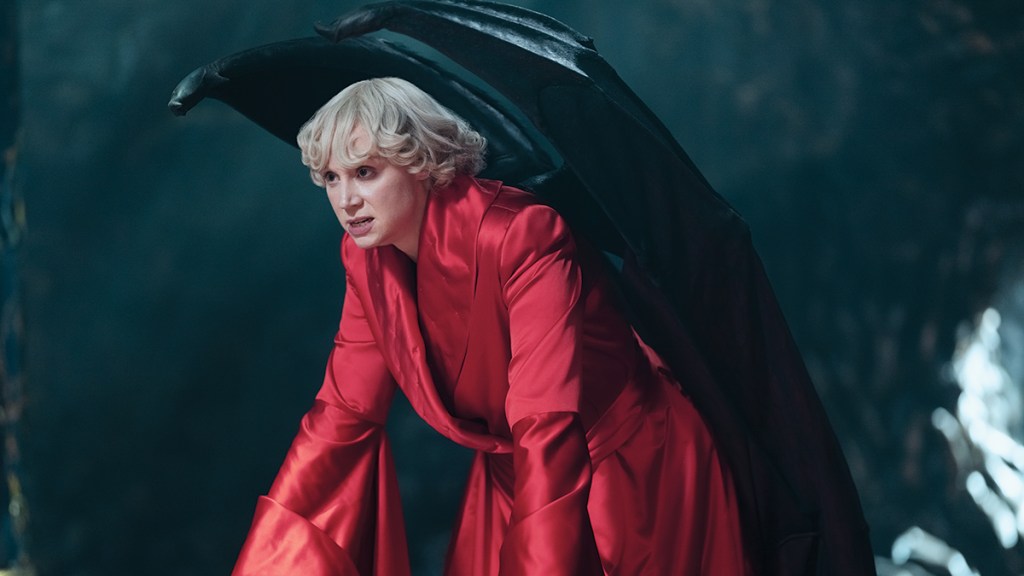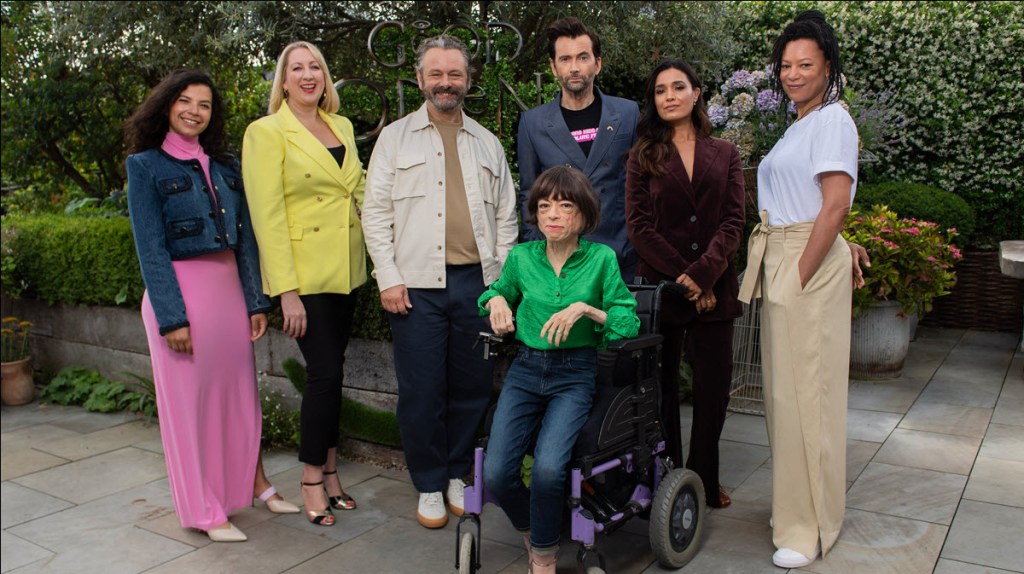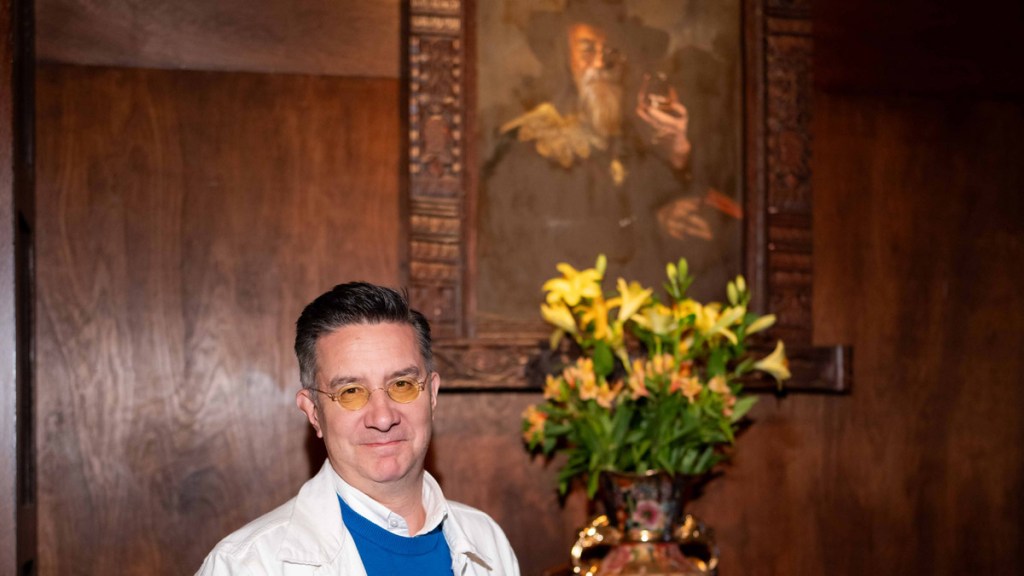Terry Pratchett “Would Have Been 100% Open” to Diversity in Good Omens
Pratchett’s “voice on Earth” Rob Wilkins confirms that the late author would have given his blessing to the diverse gender, race and sexuality in the Good Omens TV series.
When the late author Terry Pratchett, and Rob Wilkins – then his personal assistant, now head of Pratchett’s literary estate – visited a Somerset school to see a production based on one of Pratchett’s novels, they were met with a surprise.
“There’s a school in Bruton, just north of where we live and we were invited along for a school play” remembers Wilkins, speaking to Den of Geek on the set of the Good Omens TV series on which he serves as Executive Producer. “We were sitting in the Headmaster’s office. The Head of Drama came to see us and was going to take me and Terry along to go into the school hall where everyone was present, ready to put on a performance of Johnny and the Dead.
“As we were walking along, I realised that the Head of Drama was one step behind, then two steps behind, then three steps behind the Headmaster and was deliberately pulling me back from Terry and the Head. I wondered what was going on. And eventually they turned the corner and she stopped me and said, ‘Look, just to let you know, we haven’t gone for Johnny Maxwell. It’s going to be a Jenny Maxwell’. And I said, ‘Okay, but I’d better warn Terry’, thinking, ‘Yeah, I dunno about that’.
“So I sidled down next to him in the front row, leant over, and I said, ‘Terry, just so you know, no surprises, it’s gonna be Jenny Maxwell’. There’s a little bit of a pause and he turned to me and said, ‘Just to let you know, if I was to write those books right now, there is no doubt in my mind that I’d have written Jenny rather than Johnny’. And that was a lovely moment”.
More than just a lovely moment, it’s confirmation that Terry Pratchett gave his blessing to adaptations of his work that reflected changing social contexts, and was happy to embrace more diverse casts of characters as time moved on.
“Terry, I’m sure would’ve been 100% open to these things”, Wilkins assured Den of Geek. And despite what some corners of the internet would have you think, he’s not alone in that.
Adapting 20th Century Books for 21st Century Audiences
Over the past few years, we have seen the release of several TV adaptations of books written in the 20th century that increased the diversity of the story’s cast. Some characters have been played by actors of a different skin colour, some characters have been gender-flipped, and there’s been an increase in representation for non-heteronormative relationships.
And because the Internet is what it is, there have also been many reactions to this, some of them negative. This has been a particular problem for The Rings of Power, because JRR Tolkien has passed away and an awful lot of people seem to think they know what he would have wanted in adaptations of his work. Given Tolkien’s vehemently anti-Nazi stance and his extreme willingness to change things when he needed to (we have said it before and we will say it again: he changed the story of Bilbo and Gollum’s riddle-game in The Hobbit after it had already been published to make it fit better with The Lord of the Rings), we do not think Tolkien, had he lived into the 21st century, would have objected to the inclusion of people of colour or an increase in female characters in adaptations of his work. But because he is not here, it has been left to the showrunners, actors, and allies – including Neil Gaiman – to defend these decisions.

The Sandman and House of the Dragon have faced similar trolling for featuring a diverse cast of characters. Indeed, Gaiman has had to point out repeatedly that some of the characters represented as gay in The Sandman were, in fact, gay in the original graphic novels as well. Other characters have been gender-flipped or cast as actors with a different racial or ethnic background to the original illustration, or in the case of House of the Dragon, a description of an ethnic background that is, in fact, a made-up ethnicity with an inherent connection to dragons anyway.
But The Sandman and House of the Dragon have a distinct advantage over The Rings of Power in dealing with these issues because the authors of both are alive, are involved in the adaptations, and are able to state quite clearly their support for diverse casts. George RR Martin has been supportive of the choices made in House of the Dragon as a whole and of the cast, and even mentioned way back in 2013, when Game of Thrones was still fresh and new, that he had thought of making all the Valyrians (i.e. Targaryens and Velaryons) Black, but came up with the idea too late. Neil Gaiman has been vocally supportive of the increased diversity in the casting of The Sandman, talking about how he looks at his own work and questions whether, for example, he might have written a particular character as male if he was writing now, and how excited he is about the changes.
Good Omens Cast: the Novel vs the TV Series
The novel that Good Omens is based on (and the outline that will form the basis of season three if it goes ahead) was written by two authors; Gaiman, and Terry Pratchett, who sadly passed away in 2015. It has faced less overt backlash thanks to the extremely popular casting of David Tennant and Michael Sheen in the lead roles. However, the show does noticeably embrace a more diverse cast than the book.
There is a list of Dramatis Personae at the beginning of Good Omens that features 10 male characters, five female, four anthropomorphic personifications (three male, one female) and eight characters who are technically without gender, but every single one of them is referred to with he/him pronouns.
The TV show, on the other hand, features a cast that is diverse in terms of gender and race and includes actors with disabilities. The romantic side of Crowley and Aziraphale’s relationship, which has its roots in the book, is made slightly more explicit in season one and substantially more explicit in season two, alongside the introduction of new characters who are also ethnically diverse and in non-heteronormative relationships.

Of course, Good Omens has Gaiman as Creator, Writer, and Executive Producer, who can defend the choice to embrace inclusive casting as co-author of the book. But it is important to know that this does not mean Pratchett’s voice has been left out, nor is there any reason to think Pratchett would have thought any differently. Although he is sadly unable to speak about the series himself, Pratchett is represented as Executive Producer by Rob Wilkins.
Wilkins explained to Den of Geek that “[his] job on Earth is to be Terry’s voice”, and talked enthusiastically about how he walks on the set of Good Omens and feels Pratchett’s presence.
Pratchett and Character Diversity
Like Gaiman, Pratchett was a writer who always aimed at a diverse cast of characters anyway. His Discworld books, for example, include a number of very well-written, well-rounded and memorable female characters, from the formidable Granny Weatherwax and Angua von Uberwald, to the romantic Magrat Garlick and Agnes Nitt (a.k.a. Perdita). However, also like Gaiman, they did tend to be outnumbered by male characters, especially early on. In mixed-gender groups like the Ankh-Morpork City Watch, for example, male characters clearly outnumber female. There are 41 Discworld books, 26 of which have a male lead character to 15 with a female lead character. Pratchett introduced female lead characters as early as the third book, Equal Rites, which came out in 1987 and is about feminism. But it is notable that Eskarina Smith’s admission to Unseen University did not pave the way for any more women, and that the number of female-led books increased substantially once young witch Tiffany Aching was introduced in The Wee Free Men in 2003.
BBC America’s recent television series The Watch, which was loosely inspired by the Discworld, employed inclusive casting and gender-flipped some characters. However, unfortunately, the series was an adaptation of the Discworld in name only, with both Pratchett’s daughter Rhianna and Gaiman expressing on Twitter that the series did not bear any real relation to its supposed source material.
This had nothing to do with the inclusive casting, though. The substantial changes to the source material went far deeper than that and related to plot, character, setting – just about everything. Just like Tolkien and his objections to an early attempt to make a Lord of the Rings film, it is usually important to authors that the spirit of their work is respected when making changes for a new medium, and Pratchett was no exception – that is why, when he was dying, he asked Gaiman to make Good Omens.
Making Changes That Need to be Made
Avoiding excessive changes to the source material does not mean avoiding all change. “People love the written word so much. But what certain people want”, Wilkins (pictured below) told us, “is the book translated straight from the page onto the screen. So they actually want Stephen Fry and Helen Mirren sitting in armchairs reading the book on the screen so they can close their eyes and listen to it. But hang on, isn’t that an audiobook? To do what we’re doing here, a lot of things have to change. The book is a really lousy medium to translate. But if there’s enough in there that the fans can see what you intended was good and your intention was to have a lightning rod running through to the written word, then they’re happy. It’s so important”.

And of course, Gaiman acts as a voice for his co-author in the case of Good Omens as well. “If the fans see that Neil’s made a decision, then that’s it”, Wilkins said. “It’s enshrined, it’s encapsulated. Neil has said, ‘It’s okay’, so we’re all okay. And he can talk for Terry in that instance. So me and Neil can talk about it in advance. But certainly anything that Neil does is rubber-stamped by myself, the estate, Terry’s daughter Rihanna, and then the fans will accept it as being a good thing”.
And this is what we need to remember about all of these adaptations, whether their authors are with us or not. Most authors want the spirit of their book and their characters and the world they created to be carried across into any TV or film adaptations. But the vast majority of them have no problem with changes being made that help translate the story to a new medium, with inclusive casting, with their characters being represented by an actor of a different race or gender, or with the inclusion of LGBT relationships in their stories. So let’s just embrace the beautiful variety of the world we live in and move on.
Good Omens season two is available to stream now on Prime Video.

